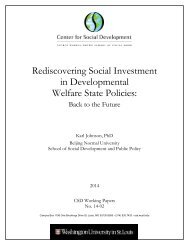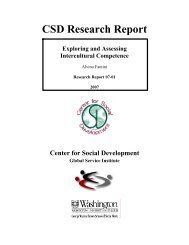Perceived Effects of International Volunteering - Center for Social ...
Perceived Effects of International Volunteering - Center for Social ...
Perceived Effects of International Volunteering - Center for Social ...
You also want an ePaper? Increase the reach of your titles
YUMPU automatically turns print PDFs into web optimized ePapers that Google loves.
valued skill in an increasingly global work<strong>for</strong>ce where international, intercultural, and interracial<br />
project teams are commonplace. 30<br />
In line with this skill, the international experience also reportedly increased alumni interaction with<br />
individuals from other racial or ethnic groups. Some alumni indicated that they have “become a<br />
more tolerant and accepting person” or “more patient and understanding <strong>of</strong> other people and their<br />
backgrounds.” By interacting with people outside <strong>of</strong> their own racial or ethnic circles, alumni<br />
realized that people from all walks <strong>of</strong> life are more similar than they are different:<br />
I realized how similar we all are to each other. Governments and cultures may be different, but people<br />
are the same.<br />
I know that the culture that I lived in with always be with me and be a part <strong>of</strong> the decisions I make in<br />
the future. I also see people <strong>of</strong> different races differently now. I was not racist be<strong>for</strong>e, but I feel no<br />
barriers like I did be<strong>for</strong>e.<br />
Alumni from both organizations reported high levels <strong>of</strong> intercultural understanding. This exposure<br />
<strong>of</strong>ten helped even in the short term, as expressed by one alum: “In spite <strong>of</strong> the fact that my<br />
experience was short, it helped continue the process <strong>of</strong> opening my mind to other cultures and<br />
worldviews.” Despite a high level <strong>of</strong> intercultural understanding among both groups, WorldTeach<br />
alumni were more likely than CCS alumni to agree that the volunteer experience helped increase<br />
31<br />
socialization with diverse groups.<br />
Some claimed that the volunteer experience made them feel like a “citizen <strong>of</strong> the world.” A few,<br />
however, also reported that the experience served to strengthen their sense <strong>of</strong> what it means to be a<br />
U.S. citizen. As one respondent wrote, “It totally changed my identity as an American. It made me<br />
feel more American and more positive about my own culture and identity.” Some claimed that the<br />
experience helped them learn about their cultural identity by allowing “time to reflect upon myself<br />
since I was in a different culture and could examine myself out <strong>of</strong> context and really see what was<br />
there.”<br />
Overall, alumni reported learning a great deal from the experience, not only about themselves but<br />
also about global issues and affairs. These respondents believed volunteering in the community gave<br />
them firsthand knowledge <strong>of</strong> community life and the daily struggles <strong>of</strong> individuals in the developing<br />
world. Being immersed in the host culture increased their awareness <strong>of</strong> the causes and consequences<br />
<strong>of</strong> poverty and deprivation. In line with this, many reported that their views on social and economic<br />
development are now more “realistic” and practical, with a belief that development must be<br />
grounded in local grassroots participation:<br />
I am now perhaps less likely to assume easy fixes to social problems—I think that volunteers can only<br />
do so much, provide some new options and examples, but ultimately that change must come from<br />
within a community, not without.<br />
30 Dhooper & Moore, 2000; Iles & Hayers, 1997; Kandola & Fullerton, 1998<br />
31 t = 2.55, df = 253, p < 0.05, x1 = 5.1, x2 = 4.5, sd1 = 1.8, sd2 = 1.7<br />
C ENTER FOR S OCIAL D EVELOPMENT<br />
W ASHINGTON U NIVERSITY IN S T . L OUIS<br />
28
















